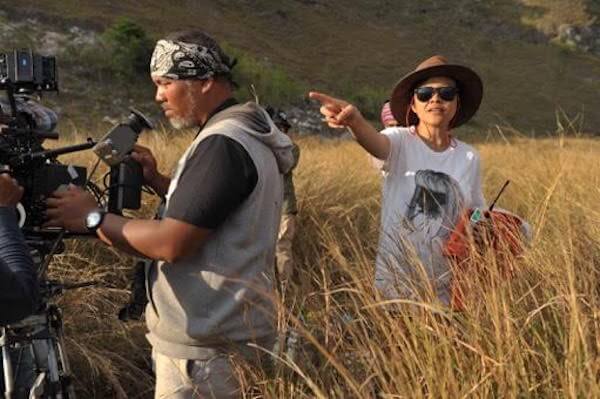Anwar Congo (r.) being made up for a film in which he plays a victim of the torture and his allies unleashed on opponents in Indonesia.ANONYMOUS/ | COURTESY: DRAFTHOUSE FILMS
Philosopher Hannah Arendt, who came up with the notion of the banality of evil, might not like “The Act of Killing.” In this documentary, evil isn’t committed by anonymous gray bureaucrats, but instead flashy gangsters who dreamed of being Elvis and Marlon Brando. Joshua Oppenheimer — an American director based in Denmark — takes an unconventional approach to the massacre of two million “communists” in ‘60s Indonesia by gangsters and paramilitary squads. Essentially, the bad guys won, got to write the rules, and retain power today.
Here, they also get to tell the stories. There are moments in “The Act of Killing” that expose a moral black hole so sickening that it takes your breath away, such as a perky talk show on which now-elderly gangster Anwar Congo brags about killing communists in front of a studio audience dressed in paramilitary garb.
Oppenheimer’s solution — or the closest he ever comes to one — is to allow men like Anwar to make films about their experiences. As it turns out, watching and working around cinema had been central to their lives when they began their killing campaign, and he hopes that actually making a film might set them on the right path, as corny as that sounds. If the project seems like something Oprah would commission, keep in mind that it was politically risky enough that the Indonesian co-director was billed as “Anonymous,” unable to reveal their identity.
Joshua Oppenheimer examines what can be learned from documenting one’s own crimes
Over the past year, there’s been a great deal of debate about whether cinematic violence has the power to trigger real-life violence. “The Act of Killing” suggests that it can do so. Anwar and his fellow gangsters hung out in front of movie theaters, scalping tickets. Part of their beef with the communists stemmed from the party’s desire to ban the American films they loved. They would pump themselves up before torturing and murdering someone by watching movies, even ones as innocuous as ‘60s Elvis vehicles. But Anwar credits gangster films with teaching him specific murder techniques, such as his favorite — strangling someone with a loop of wire.
However, Oppenheimer’s take on movie violence is more complex than a simple denunciation. He suggests that it can also lead to catharsis and empathy. Anwar is reflective enough to be haunted by nightmares. He’s tried to chase them away by dancing and self-medicating with alcohol, marijuana, and ecstasy, but these techniques haven’t worked. He dramatizes his nightmares by having an oddly costumed ghost of a murdered communist — he looks like a Cirque du Soleil version of Edward Scissorhands — come back to haunt him.
Playing a torture victim leads to a real breakthrough. In a slickly stylized scene, reminiscent of a film noir, Anwar plays a communist being interrogated, brutalized, and murdered. With Oppenheimer present, he invites his grandsons to watch it (over Oppenheimer’s objections), and it produces a surprising epiphany. Anwar finally experiences a tiny tinge of what his victims experienced. He reacts by going to the room where he killed many people and vomiting. That’s as close to hope as “The Act of Killing” ever gets.
The Indonesian government’s definition of “communists” encompassed intellectuals, ethnic Chinese, leftists, and anyone else it found expendable. The paramilitary group organized in the ‘60s still thrives; “The Act of Killing” shows Indonesia’s vice president speaking at one of their rallies. The regime relies on the support of gangsters.
But Oppenheimer also makes parallels between Indonesia and America. He himself doesn’t need to editorialize — one of Anwar’s friends does it for him. Confronted by standards of the Geneva Convention, he points out that winners always write the rules where war is concerned. The Bush administration’s crimes were never punished, just as the Indonesians got away with murder. Some of the more startling moments in Anwar’s film illustrate the arrogance that comes with such power. In one scene — an otherwise pleasant and pretty musical number — a murder victim thanks Anwar for sending her to heaven. Here, we get a glimpse of the kind of cinema the Nazis might have made had they won World War II.
“The Act of Killing” begins with boastful dreams of stardom and ends with an old man puking his guts out. Maybe evil really is pretty banal after all. This is one of the most disturbing films I’ve ever seen, although all the violence it shows is fictional. Rarely has the full potential of cinema itself been brought home so forcefully. After watching it, you might start seeing dead communists in your dreams, too.
THE ACT OF KILLING | Directed by Joshua Oppenheimer | In Bahasa with English subtitles | Drafthouse Films | Opens Jul. 19 | Landmark Sunshine, 143 E. Houston St., btwn. First & Second Aves. | landmarktheatres.com







